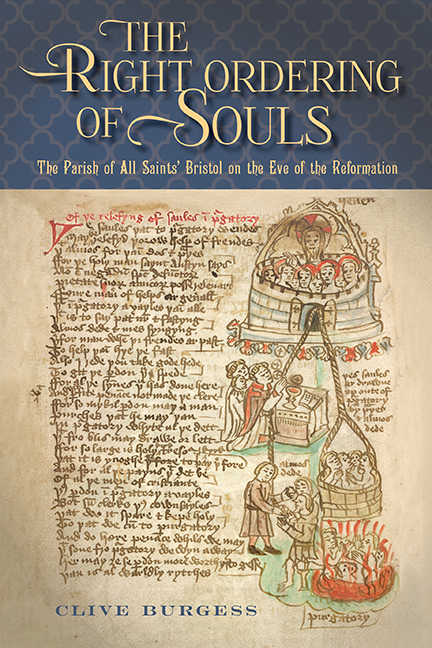Book contents
- Frontmatter
- Dedication
- Contents
- List of illustrations
- Acknowledgements
- Miscellaneous Frontmatter
- Abbreviations
- Notes
- map
- Part I For the increase of the divine service
- Part II All Saints’, Bristol, and its parishioners
- Part III Commemorating the dead
- Part IV Leaders and administrators
- Part V Ordering the parish
- Appendices
- Bibliography
- Glossary
- Index
- Miscellaneous Endmatter
Part IV - Leaders and administrators
Published online by Cambridge University Press: 05 May 2018
- Frontmatter
- Dedication
- Contents
- List of illustrations
- Acknowledgements
- Miscellaneous Frontmatter
- Abbreviations
- Notes
- map
- Part I For the increase of the divine service
- Part II All Saints’, Bristol, and its parishioners
- Part III Commemorating the dead
- Part IV Leaders and administrators
- Part V Ordering the parish
- Appendices
- Bibliography
- Glossary
- Index
- Miscellaneous Endmatter
Summary
WEALTHY men and women made a point of investing property, money and equipment to develop All Saints’ resources, benefiting their own souls along with all the others in its care, both living and dead. Generosity by some obliged others to devote steadfast effort in overseeing the parish's increasingly complex interests, which included the management and maintenance of a growing property portfolio; but parishioners would never have entrusted so much to contemporaries and successors had they not had confidence in All Saints’ administrative competence. While developments may be hard to chart, managerial practices had emerged by the second half of the fifteenth century (and probably well before that) equal to the demands made of the parish. Such a capacity not only helped to shape parishioners’ expectations in the decades preceding the Reformation but must also have helped to reinforce the behavioural procedures that have emerged in previous discussion. It is clearly time to investigate how All Saints’ organised itself both to manage and to advance shared interests.
The first chapter in this section considers the role played by the parish clergy and explores their generosity. Well aware of their pastoral and liturgical responsibilities to their flocks, priests, like everyone else, hoped for salvation. Since this was a goal best achieved by collaboration with others in the parish community, the clergy's interests integrated closely with those of the churchwardens and the parish elite. One of the themes that then emerges clearly in the chapter following (chapter 9) is the degree of co-operation visible between clergy and different registers of the laity, as each worked closely with the others to direct parish affairs in the decades preceding the Reformation.
- Type
- Chapter
- Information
- 'The Right Ordering of Souls'The Parish of All Saints’ Bristol on the Eve of the Reformation, pp. 259 - 260Publisher: Boydell & BrewerPrint publication year: 2018

